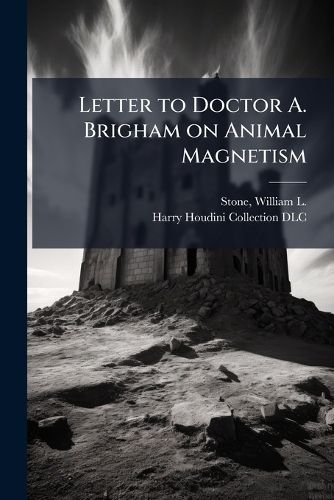Readings Newsletter
Become a Readings Member to make your shopping experience even easier.
Sign in or sign up for free!
You’re not far away from qualifying for FREE standard shipping within Australia
You’ve qualified for FREE standard shipping within Australia
The cart is loading…






"Letter to Doctor A. Brigham on Animal Magnetism" recounts William L. Stone's investigation into the phenomenon of animal magnetism, also known as mesmerism, in the early 19th century. This fascinating document details Stone's remarkable interview with Miss Loraina Brackett while she was in a state of somnambulism. Stone's letter provides a firsthand account of the beliefs and practices surrounding animal magnetism during a time when scientific and pseudoscientific ideas were rapidly evolving. This historical work offers a glimpse into the popular interest in the occult and the paranormal that gripped the public imagination, capturing the spirit of an era fascinated by the hidden potential of the human mind. A valuable resource for historians and anyone interested in the history of psychology and the occult.
This work has been selected by scholars as being culturally important, and is part of the knowledge base of civilization as we know it. This work was reproduced from the original artifact, and remains as true to the original work as possible. Therefore, you will see the original copyright references, library stamps (as most of these works have been housed in our most important libraries around the world), and other notations in the work.
This work is in the public domain in the United States of America, and possibly other nations. Within the United States, you may freely copy and distribute this work, as no entity (individual or corporate) has a copyright on the body of the work.
As a reproduction of a historical artifact, this work may contain missing or blurred pages, poor pictures, errant marks, etc. Scholars believe, and we concur, that this work is important enough to be preserved, reproduced, and made generally available to the public. We appreciate your support of the preservation process, and thank you for being an important part of keeping this knowledge alive and relevant.
$9.00 standard shipping within Australia
FREE standard shipping within Australia for orders over $100.00
Express & International shipping calculated at checkout
"Letter to Doctor A. Brigham on Animal Magnetism" recounts William L. Stone's investigation into the phenomenon of animal magnetism, also known as mesmerism, in the early 19th century. This fascinating document details Stone's remarkable interview with Miss Loraina Brackett while she was in a state of somnambulism. Stone's letter provides a firsthand account of the beliefs and practices surrounding animal magnetism during a time when scientific and pseudoscientific ideas were rapidly evolving. This historical work offers a glimpse into the popular interest in the occult and the paranormal that gripped the public imagination, capturing the spirit of an era fascinated by the hidden potential of the human mind. A valuable resource for historians and anyone interested in the history of psychology and the occult.
This work has been selected by scholars as being culturally important, and is part of the knowledge base of civilization as we know it. This work was reproduced from the original artifact, and remains as true to the original work as possible. Therefore, you will see the original copyright references, library stamps (as most of these works have been housed in our most important libraries around the world), and other notations in the work.
This work is in the public domain in the United States of America, and possibly other nations. Within the United States, you may freely copy and distribute this work, as no entity (individual or corporate) has a copyright on the body of the work.
As a reproduction of a historical artifact, this work may contain missing or blurred pages, poor pictures, errant marks, etc. Scholars believe, and we concur, that this work is important enough to be preserved, reproduced, and made generally available to the public. We appreciate your support of the preservation process, and thank you for being an important part of keeping this knowledge alive and relevant.